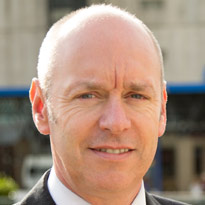Ade Memoire: feeling appathetic
- 15 March 2016

Hardly a day goes by without the emergence of some new app that’s going to change my life, transform the health service, or deliver to me – on a plate – the key to all my record management problems.
Now, as many people will know, the main problem I have with records is how I can squeeze more 180g vinyl into my lounge. I am a bit appathetic.
Yet on it goes, relentlessly. The NHS should be making more use of apps. The NHS is lagging behind. Everyone has a smart-phone these days. The NHS needs to get with the programme.
The smart phone was invented in around 2007 as far as I’m concerned, with the iPhone. This will upset some users of Nokia Communicators, Blackberries and even this gem, the Simon (c1994).
But that still means the smart-phone has been around for the best part of a decade. The iPad arrived in 2010. That’s more than five years ago. The health app thing must be the longest hype cycle of all time.
When will we get off the peak of inflated expectation and dive headlong into the trough of disillusionment? I can’t wait.
What's the problem?
There isn't a problem, of course. I am as much of an avid user of Trainline (other rail timetable and booking apps are available) as anyone else.
It's just that a lot of apps are used in circumstances in which the app provider does not have to connect anything together end-to-end.
It's all passive use of information like Shazam, or me sharing information with me, like Evernote, or me just using a website where I give them my credit card details and quite frankly I can be the Duke of Marlborough.
Unfortunately, health isn’t like that; health providers are not islands – and they need to know who you are. So, on the face of it, the more acceptable comparison between apps generally and health apps is banking.
Banks surely have to know who I am, and connect me with a real identity and record? In fact that's not so cut and dried. The customer is responsible for setting up a bank account; all the bank has to do is keep tabs on that person within a one-to-one relationship.
Getting back on track
Some readers may have seen the Rt Hon George Freeman talking recently about ‘laying down the tracks’ for a digital health service.
In a video that he originally shot for the first Digital Health Leadership Summit, he talks about the different roles of the centre and local organisations in setting and enforcing standards – building the tracks – and creating services to run over them.
Well, at the moment it seems as if enterprise electronic patient records – our hospital and GP systems – are on good old George Stevenson's standard gauge; while the consumer apps run on Isambard Kingdom Brunel's broad gauge and a selection of narrow gauges.
In order for the tracks to join up when they do actually meet we do, of course, need some standards to be used. Hopefully, they will be chosen via a better process than the one used to come up with one railway gauge; which as everybody knows was chosen because 4'8” happens to be the distance between the neck and ankles of a damsel in distress.
Meantime, there’s a lot of talk about ‘meaningful use’ and getting potential ‘passengers’ on board with them. Meaningful use for apps should include a measure of how they connect a person to their record and their care professionals.
Connect it up
Health is a complicated business, and the business associated with health is complicated, and the apps that run health systems are complicated.
It amuses me how people compare a health application for doctors with shopping at your local dotcom. Nobody taught me to use Amazon, but as far as I'm aware – apart from the counting bit – nobody ever taught me to go shopping.
At least compare us with something truly complicated, like Football Manager 2016 with enhanced virtual reality.
There are a seemingly unlimited number of parameters that can be presented to decision-making clinicians. It is clear that this data will come from increasingly diverse sources, such as patient held devices.
There is a lot of publicity for products such as Apple HealthKit, that are supposed to take information from different devices and hold it in one place for use by other software packages, including the kind of wellness trackers that users set up themselves.
But at the moment, although some individual suppliers are using them to grab data from phones, they remain another largely disconnected bunch of systems.
Understanding where we are now
I propose that the media, and everyone else, should start to clearly understand and categorise health related apps. Broadly they come into two camps:
- Disconnected
- Connected
The first might be very useful. They might even save me or my hospital time. The MicroGuide, which won a recent EHI Award, is a good example of one of these. A simple idea yet well executed, it enables an organisation to upload policy documents for decision support.
Staff members can have the app for free; the money comes from a subscribing organisation paying annually to have its data within the system.
Initially, the Microguide was mostly aimed at doctors prescribing antibiotics, but it has grown since. This is great, but it doesn’t let me log-in in patient context, or allow me to prescribe, or allow me to save any of this back to the patient record.
Potentially connected are the myriad of health or well-being apps that will allow you to track steps or – in a few cases – your own diabetes or other condition management plan.
But we don’t have enough of these apps yet; and a lot of the ones that we do have are not connected to much, if anything.
I guess there must be a lot of developers who are waiting to step into this world, but they need something to plug into. At the moment they must feel like the chap who invented the telephone before he phoned a friend.
From the consumer perspective, there’s another side to all of this, and that’s safety. How do I know an app is safe to use? This, as I understand it, will be the subject of a kite marking type system.
I hope this is more successful than the one that decided the stainless steel teapots in 1970s motorway service stations were fit for purpose. I've no reason to suppose it won’t be.
Bright future
So, I think that the future is bright – even so bright you gotta wear shades – and the potential is enormous for the health app. However, it is questionable whether we are even yet at base camp.
Despite this, we are dealing with youngsters who don't even remember when apps never existed, never mind the internet or the mobile phone, so this connected world – when it arrives – will just seem natural for them. Little do they know how hard we will have worked to create it.
Here's what Douglas Adams thinks:
1. Anything that is in the world when you’re born is normal and ordinary and is just a natural part of the way the world works.
2. Anything that's invented between when you’re fifteen and thirty-five is new and exciting and revolutionary and you can probably get a career in it.
3. Anything invented after you're thirty-five is against the natural order of things.
 |
Adrian ByrneAdrian – Ade – Byrne is director of IM&T at University Hospital Southampton NHS Foundation Trust and chair of the Health CIO Network.
|
 |




